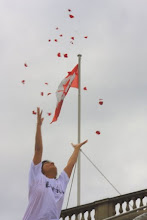 Please visit here: www.youtube.com/davos and vote for me to go to Davos.
Please visit here: www.youtube.com/davos and vote for me to go to Davos.This is the opportunity I've been dreaming about.
When I made my pitch to Davos, via YouTube, things were cut due to time constraints.
My ardent belief, which keeps me awake at night, is that this topic MUST be debated in the mainstream. This is what Davos offers: a space where business leaders, politicians, scientists, religious leaders, cultural gurus and the media meet. Every single one of these has a part to play in ending FGM.
It also aligns with my personal philosophy, having "grown up" in a career where the partnership between business, government and civil society was the only way to effect lasting change.
My thinking is straightforward. The overall objective is to end female genital mutilation within the next generation. I believe that at the moment there are three main needs:
- raise global awareness;
- get decision makers to increase resources and funding;
- get this money to communities on the ground.
There are many proven interventions, that advocate working with communities to ensure that their voices are heard. The best model for this is modelled on social change theory - I've discussed it before here and it comes from UNICEF/Innocenti research.
To access this, go to this link:
http://www.unicef-irc.org/search.php?q=FGM&search.x=0&search.y=0
You'll see many documents about abandonment strategies. These have been operating in communities in Sudan, Ethiopia, Eritrea - where prevelance is well over 80%. I've copied a UNICEF press release later in this post, to outline their position. However, whilst UNICEF have the model, what is lacking is the massive implementation that this needs to allow change to happen. You will see that the press release is dated November 2005 - almost five years old. Yes, there is some gradual change in some communities, but it is not enough.
It is also not UNICEF's job alone. Changing FGM is going to require a massive shift in positions to swing a pendulum back towards allowing women more access to decide their own futures and self-autonomy. In this, everyone has a role - communities, civil society, governments, legal bodies, regional committees and international interests. Even business has a role to play.
So this is why you must send me to Davos - so that I can make that case volubly, stand in front of those who have their hands on various levers of power and help them decide to shift and pull together to make change happen.
I believe that's in my gift. Please help me get there.
--------------------
UNICEF Press release - 24 November 2005
• FGM/C is becoming a global problem. Not only is FGM/C practiced among communities in Africa and the Middle East, but with increased population movements and migration, FGM/C is also an issue in immigrant communities throughout the world.
• Real social change is a lengthy and complex process. Still, there is every reason to be optimistic that with global support, FGM/C can be ended within a single generation. This is possible because we understand the elements needed to accelerate the abandonment of the practice within practicing communities.
• Never before has the global community had such a refined understanding of why FGM/C persists. FGM/C ensures a girl’s or woman’s status, marriageability, chastity, health, beauty and family honour. This deeply entrenched social and cultural tradition is so powerful that even when families are aware of the harm it can bring, they are willing to have their daughters cut.
• A number of promising initiatives are supporting communities to abandon FGM/C in Africa and the Middle East. The most successful guide communities to define the problems and solutions themselves. They encourage people to engage in non-judgemental public discussion. They equip families with knowledge on human rights and responsibilities. They encourage communities who have made the decision to abandon the practice to spread their message to their neighbours
• Communities cannot end FGM/C without support. In order to end FGM/C on a large scale and across countries, communities need to be supported through legislative and policy measures, fora for public debate, and culturally sensitive media messages. They also need support from religious leaders and other opinion makers.
• Engaging adolescents and young people is critical to promote the abandonment of the practice. Through meaningful participation, adolescents develop the tools they need to make decisions that affect their own lives and to break vicious cycles, including gender discrimination and violence, which are passed down from one generation to the next.

